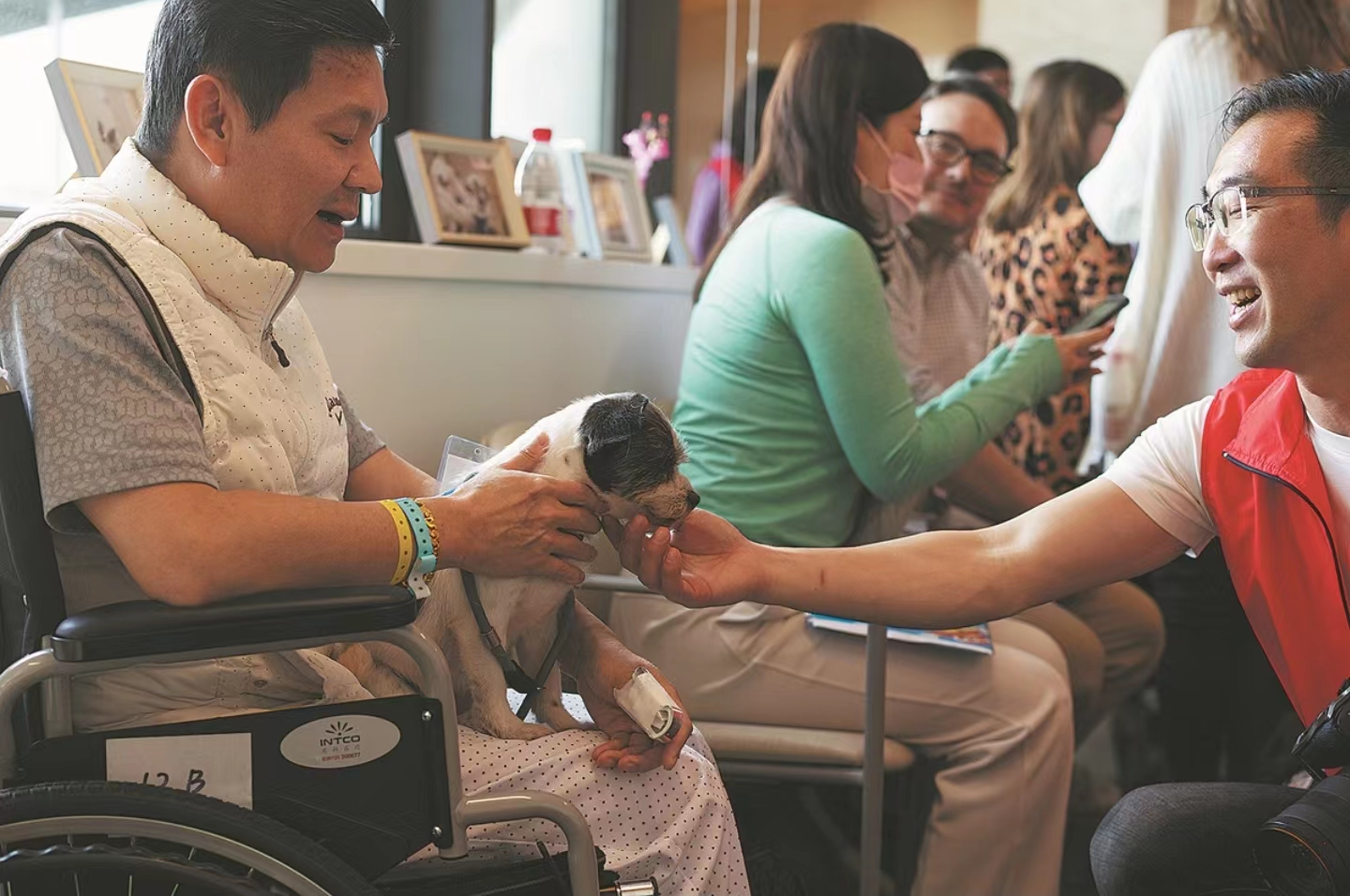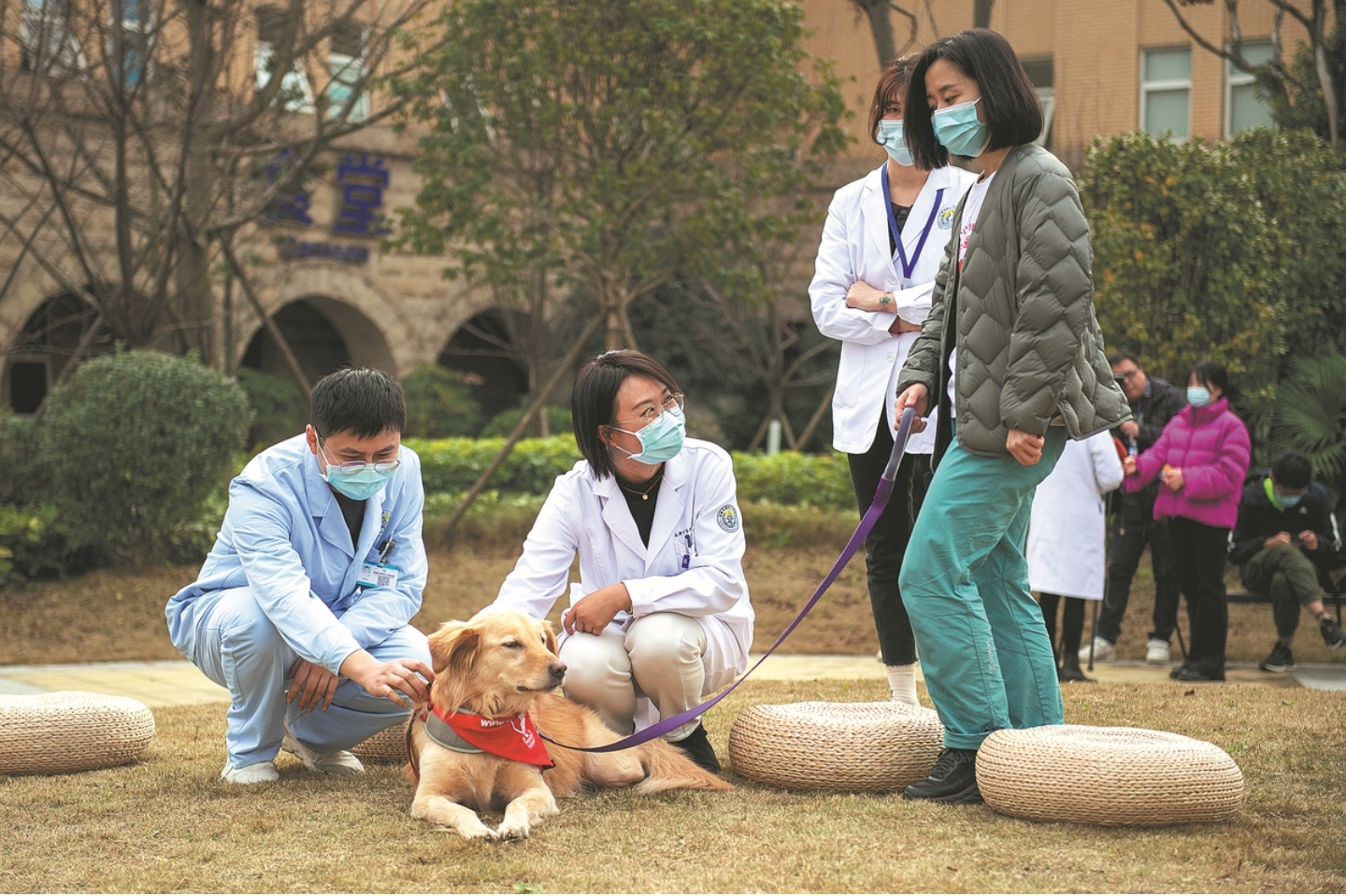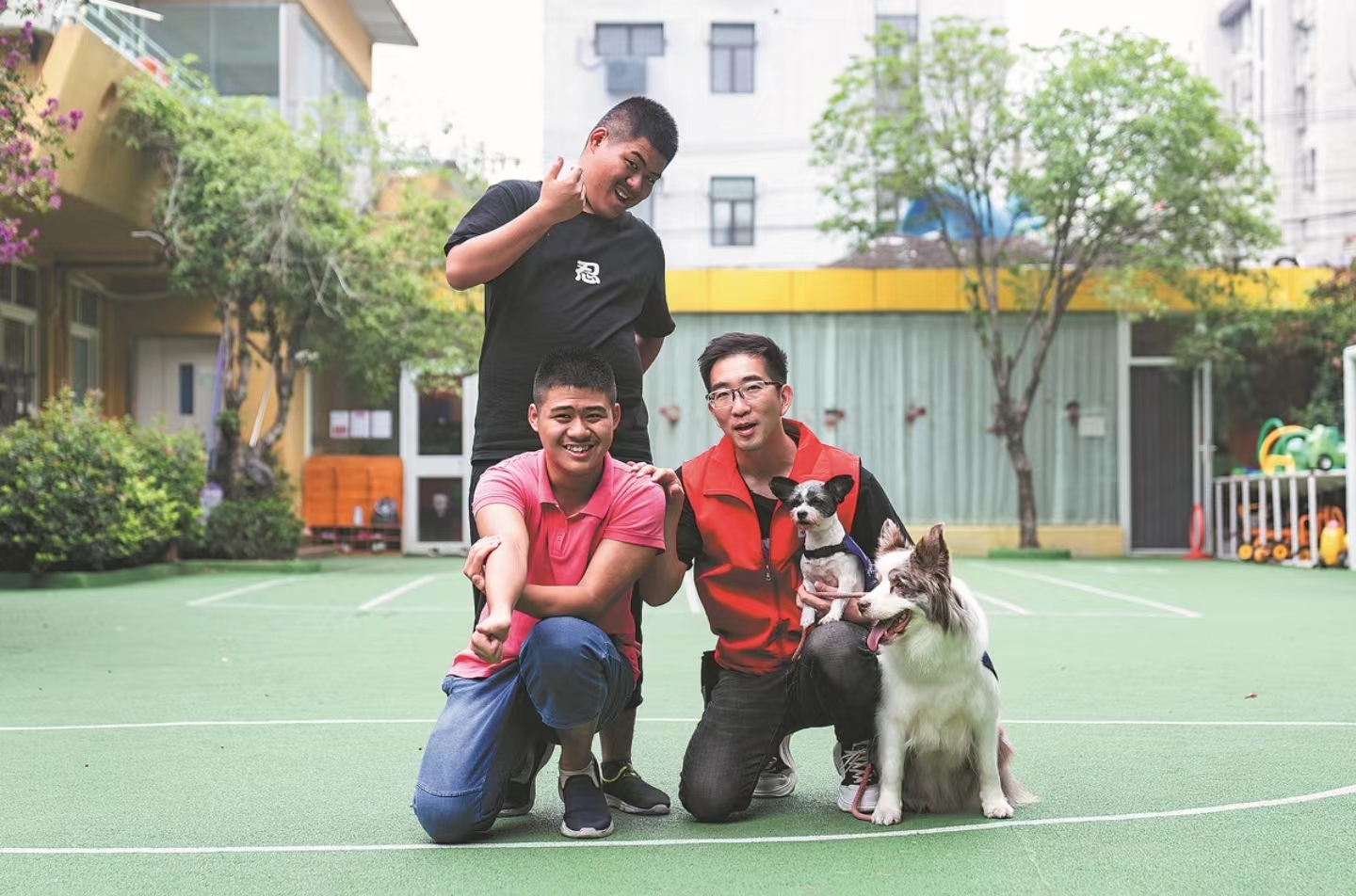
今日上海
治疗犬辅助治疗医院病人 - 2023年05月04日
Therapy dogs help hospital patients

Therapy dogs help patients at Shanghai Jiahui International Hospital last month.
Voluntary interactive sessions relieve stress, offer emotional comfort
Biubiu would probably still be a skeletal stray dog with a tangled coat were it not for the help she received from Jin Pei, a retired book editor in Shanghai.
Jin encountered Biubiu, a mixed breed with the appearance of a small schnauzer, on a wintry night in 2015 when the dog dashed out from an alleyway as Jin was walking her own canine.
"She walked fast when we walked fast, and slowed down when we did. She followed us for a long way, and I sensed she was eager to find herself a home," Jin said.
Since that night, the pair have become close companions, and in December, Biubiu became a therapy dog, visiting care homes for the elderly and rehabilitation facilities for autistic children to aid their recovery.
"I used to be extremely shy, but running into Biubiu that night really lifted my spirits. That's why I decided to send her to be trained as a therapy dog, so that she could help more people," Jin said.
Wu Qi, founder of Paw for Heal, a volunteer program established in 2012 that uses therapy dogs, said there are about 300 such animals in China. Some 95 percent of them live with their owners and are put to work when their services are requested.
Each dog must undergo a thorough training program and international-standard tests before becoming a certified therapy dog. Wu, 38, said that the animals have provided help for at least 100 institutions.
Therapy dogs have been introduced in more than 10 cities, including Beijing, Shanghai, Chengdu, capital of Sichuan province, and Xiamen, Fujian province. By the end of this year, they are expected to start work in another 10 cities, and their total number is expected to rise to 1,000, Wu said.
"By providing such a service, we hope to raise awareness among more people that dogs are more than just companions for their owners at home. They can go out into society to play a certain role for individuals in need," Wu added.
In the middle of last month, Jin and Biubiu went to Shanghai Jiahui International Hospital to help patients. The hospital is the first medical institution in the city to introduce therapy dogs.
Four other dogs also provided assistance at the hospital — Momo, a white samoyed, Dobby, a gray-and-white border collie; Yoyo, a snow-white bichon frise with a mass of fluffy fur, and Yuda, a Chinese rural dog who used to be a stray.

Andrew (left), a patient from Singapore with severe injuries received in a traffic accident, plays with Yuda, a Chinese rural dog who used to be a stray.
Free services
The volunteer services are provided for free. Within 48 hours of being called in to provide assistance, the dogs are bathed and their nails are trimmed and polished. Insect repellent must also be used on the dogs frequently.
Volunteers introduce the dogs to patients. The animals then display their skills, which include doing "high fives" with their owners, putting their paws together to make a "thank you" gesture, and making a howling sound like a wolf.
Next, they cuddle up on patients' laps and allow them to feel the softness of their fur. This interactive session lasts an hour.
Patients at the Shanghai hospital included a Singaporean in his 50s with severe head and foot injuries received in a traffic accident in February.
He had a total of 10 fractured bones in the head, ribs and limbs. He also lost the hearing in one ear and could not close one eye.
The patient, who wished to be identified only as Andrew, said, "I have never believed in destiny, but after this accident, I spent a long time adjusting my mindset to take in what had happened."
He said he has a dog at home, but pets are not allowed in the hospital. Having been admitted for two months, he was badly missing his pet.
"When I heard the therapy dogs were coming to the hospital, I told the doctor that I had to see them, as I needed to be healed mentally," Andrew said, sitting in a wheelchair while feeling the dogs' soft coats.
"I don't think I had smiled for a long time — until today. I need to stay in hospital for another two months, so I hope the dogs will return soon," he added.
Beneficial effect
In 2006, an article in the Chinese Mental Health Journal said many international studies showed that animal therapy has a beneficial effect in treating conditions such as depression, anxiety, behavioral disorders and Alzheimer's disease.
In 2018, a study by researchers from the School of Medicine at University of California, Irvine found that therapy dogs are effective in reducing symptoms of attention deficit hyperactivity disorder, or ADHD, in children.
The research results indicated that children with ADHD who received canine-assisted intervention experienced improved social skills and reduced levels of inattention.

A therapy dog arrives at a public hospital in Chengdu, capital of Sichuan province, to provide help in February.
Wu said Jin Yi and Jin Er, twin boys in Nanjing, Jiangsu province, have been regularly interacting with therapy dogs for nine years. The twins initially lacked social skills, but now teenagers, they are friendly to strangers and are helping out with family chores.
At Shanghai Jiahui International Hospital, a patient surnamed Qiu, 27, happily touched each dog and took photos with them. She halted her further education in Germany after she was diagnosed with cancer, and returned to Shanghai for medical treatment. Qiu has been hospitalized for more than two months.
"Life in a hospital environment is dull and tedious, and I feel psychologically challenged, especially when I experience bodily discomfort," Qiu said.
"The dogs are very friendly and obedient, and are somehow able to understand what we are saying. I can also sense a strong emotional connection between the dogs and their owners. I feel warmed by all of this and I'm very happy today."
Qiu added that she is interested in taking part in outdoor activities with the therapy dogs after her physical condition improves.
Lena Salzinger, 9, from Texas, United States, was at the hospital, as her mother was having breast cancer surgery that day. The girl relocated to Shanghai with her parents in October.
She said: "After coming to the city and settling in, we adopted a 1-year-old corgi. I wanted to come to see these dogs today because my corgi is so good when somebody needs extra attention. She's a very intuitive dog. She knows when I'm sad, and she'll come to me."
She added that therapy dogs are commonplace in the US.
"I hope the project at the hospital is successful and is embraced in Shanghai and many other places, because dogs are so special and really do help people at any time," she said.
Di Xinyu, head of social work and volunteer projects at Jiahui hospital, said: "Some patients' eyes lit up when they saw the dogs. We believe they will help the patients develop a more optimistic attitude and cooperate better in medical treatment."
The dogs were introduced at the hospital early this year. Di said certified therapy dogs receive special training, complete a course of vaccination, and can comfort patients who may suddenly feel socially isolated after becoming ill.
Di used to work at a hospital in the US, where she often saw therapy dogs visiting patients and helping them with rehabilitation training.
At Jiahui hospital, the dogs stay with tumor patients, those requiring physical rehabilitation, and patients with mental illness, especially the young.
"Some minors may have misunderstandings with their parents, so we design games for families to play with the dogs as a way to increase communication between children and their parents. The dogs act as a bridge in such communication," Di said.
Public hospitals, including Shanghai Mental Health Center and Shanghai Ruijin Hospital, are also considering introducing therapy dogs.
At a training session scheduled for later this month involving more than 200 hospitals and other medical care institutions nationwide, animal therapy will be introduced as one of the nonmedical therapies. The session is being organized by Peking Union Medical College Hospital and Orpea Group, a major nursing home operator in France.
Wu, from Paw for Heal, said that in addition to individuals with cognitive impairment, therapy dogs have helped those with excessive work stress, along with students and teachers under pressure from exams.
In January, data from the University of California, Los Angeles showed that 60 percent of US higher education institutions have used the services of therapy dogs.
Animal therapy is used widely in the West. Eight years ago, the US already had more than 50,000 such dogs to help people with conditions such as post-traumatic stress disorder and those facing significant social upheaval.

Jin Yi and Jin Er, twin autistic boys in Nanjing, Jiangsu province, have regularly interacted with therapy dogs for nine years.
Pass rate rises
Wu said a dog has to be at least 1 year old to be accepted for therapy training, as the animals must be in good shape physically and mentally.
The proportion of dogs passing the tests they are set has risen from 1 percent initially to between 10 and 20 percent, thanks to their owners paying increasing attention to educating their pets about daily life.
However, there are some difficulties. For example, many dogs refuse to sit, but they need to keep low and still, especially when children want to touch them. Some dogs are also sensitive and will retreat when they see people in wheelchairs or with crutches, Wu said.
"There's no limit for age, gender and species. The dog doesn't have to be extra smart, but it must be extremely stable emotionally," Wu said, adding that the owner must be 18 or older and have had the animal for at least six months.
Some dogs are as old as 10 when they are accepted for therapy work. Their owners hope that in the time left for their pets, they will help others.
Problem-solving
Jin, who owns Biubiu, started raising dogs in the 1980s. She said her pet is the best-behaved and most cooperative dog she has owned.
She did not send the dogs she raised from puppies to be trained as therapy dogs, as they were not as soft-tempered as Biubiu.
"I used to hide myself in a crowd, never daring to speak in front of others. But this dog changed my life, and I want people to see that stray dogs can play a role in society. This may work as a way to solve the problem of strays," Jin said.
About one-third of the 50 or so therapy dogs in Shanghai were adopted by their owners, many of whom share Jin's thoughts.
Stephanie Chan, who comes from Hong Kong and owns Momo, the white samoyed, who is 10, said she chose to take part in the voluntary work to show people that dogs can do valuable work.
"I don't think the dogs feel stressed when they work. In addition to the treats they are given, they like to hang out with their owners and be hugged by people. They are happy if they can sense they are liked by others," Chan said, who added that Momo is good-natured and not easily upset.

A girl walks Biubiu, a therapy dog, at Shanghai Jiahui International Hospital.
Source: China Daily

